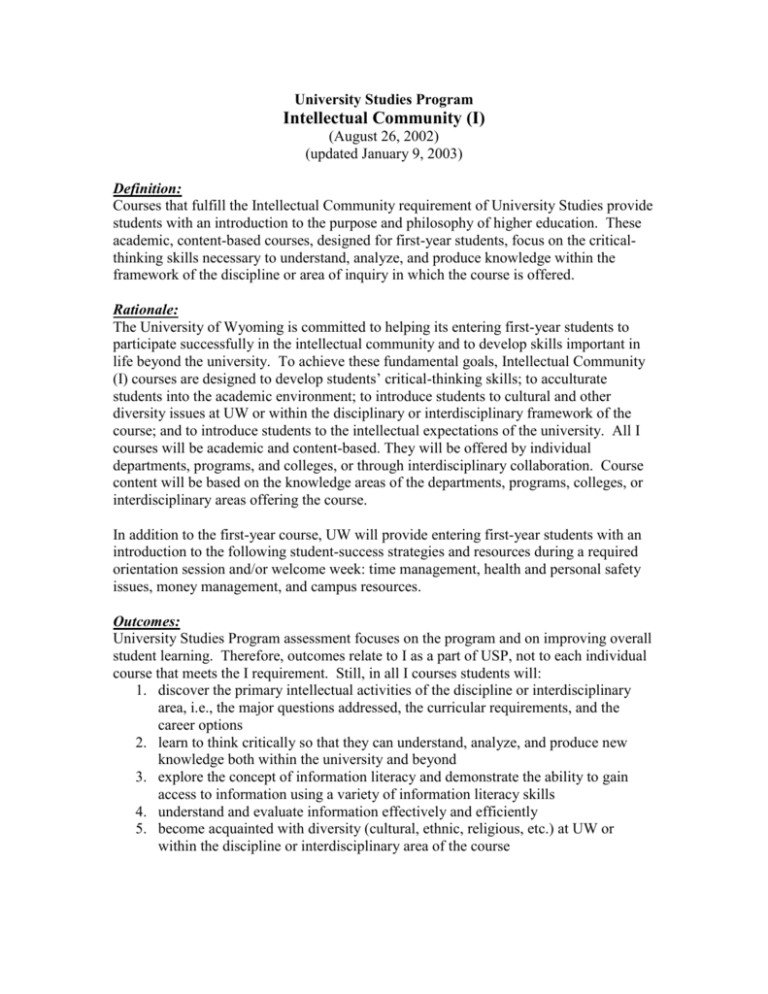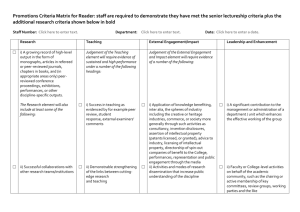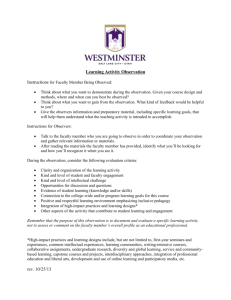Intellectual Community - University of Wyoming
advertisement

University Studies Program Intellectual Community (I) (August 26, 2002) (updated January 9, 2003) Definition: Courses that fulfill the Intellectual Community requirement of University Studies provide students with an introduction to the purpose and philosophy of higher education. These academic, content-based courses, designed for first-year students, focus on the criticalthinking skills necessary to understand, analyze, and produce knowledge within the framework of the discipline or area of inquiry in which the course is offered. Rationale: The University of Wyoming is committed to helping its entering first-year students to participate successfully in the intellectual community and to develop skills important in life beyond the university. To achieve these fundamental goals, Intellectual Community (I) courses are designed to develop students’ critical-thinking skills; to acculturate students into the academic environment; to introduce students to cultural and other diversity issues at UW or within the disciplinary or interdisciplinary framework of the course; and to introduce students to the intellectual expectations of the university. All I courses will be academic and content-based. They will be offered by individual departments, programs, and colleges, or through interdisciplinary collaboration. Course content will be based on the knowledge areas of the departments, programs, colleges, or interdisciplinary areas offering the course. In addition to the first-year course, UW will provide entering first-year students with an introduction to the following student-success strategies and resources during a required orientation session and/or welcome week: time management, health and personal safety issues, money management, and campus resources. Outcomes: University Studies Program assessment focuses on the program and on improving overall student learning. Therefore, outcomes relate to I as a part of USP, not to each individual course that meets the I requirement. Still, in all I courses students will: 1. discover the primary intellectual activities of the discipline or interdisciplinary area, i.e., the major questions addressed, the curricular requirements, and the career options 2. learn to think critically so that they can understand, analyze, and produce new knowledge both within the university and beyond 3. explore the concept of information literacy and demonstrate the ability to gain access to information using a variety of information literacy skills 4. understand and evaluate information effectively and efficiently 5. become acquainted with diversity (cultural, ethnic, religious, etc.) at UW or within the discipline or interdisciplinary area of the course Criteria for Approval of University Studies Courses: Intellectual Community (I) courses will be academic and content-based, and will encourage students to investigate learning styles and improve study strategies. In ways that are used and valued by the given discipline or interdisciplinary area, these courses will incorporate a variety of pedagogies that encourage students to develop criticalthinking skills, that provide formal and informal assignments so as to allow students to produce new knowledge, that introduce the concept of information literacy, and that incorporate technology. I courses may be approved for 1–4, or more, credit hours to accommodate the differing needs of students, departments, and program; however, all courses in this category must meet the established criteria regardless of credit hours. Courses may be offered by departments, programs, colleges, or interdisciplinary groups throughout the university with course content based on the knowledge areas of those offering the course. Though orientation activities are not incorporated into the I course, the Intellectual Community program of UW will offer a separate orientation and welcome week for entering first-year students. This orientation will include an introduction to the following student-success strategies and resources: time management, health and personal safety issues, money management, and campus resources. Recommendation: To promote dialogue, these courses will preferably have small enrollments—nineteen students or so--and generally be taught by experienced faculty members and academic professionals. Process: Using the University Studies Program criteria and outcomes, a sub-committee of three selected from the membership of the University Studies Committee will evaluate each course submitted for credit within the Intellectual Community (I) category and will make recommendations to the full committee. University Studies Program Criteria Review Sheet Intellectual Community (I) In order for first-year students to successfully participate in the intellectual community and to develop skills important in life beyond the university, Intellectual Community (I) courses are designed to develop students’ critical-thinking skills; to acculturate students into the academic environment, including exposure to cultural and other diversity issues; and to introduce students to the intellectual expectations of the university. All I courses will be academic and content-based. They will be offered by individual departments, programs, and colleges, or through interdisciplinary collaboration. Course content will be based on the knowledge areas of the departments, programs, colleges, or interdisciplinary areas offering the course. In all I courses students will: 1. discover the primary intellectual activities of the discipline or interdisciplinary area, i.e., the major questions addressed, the curricular requirements, and the career options 2. learn to think critically so that they can understand, analyze, and produce new knowledge both within the university and beyond 3. explore the concept of information literacy and demonstrate the ability to gain access to information using a variety of information literacy skills 4. understand and evaluate information effectively and efficiently 5. become acquainted with diversity (cultural, ethnic, religious, etc.) at UW or within the discipline or interdisciplinary area of the course Course Number & Prefix: Credit Hours: Course Title: Please attach a detailed course syllabus that includes the objectives or outcomes for the course and the means to assess the extent that students reach them. List any prerequisites: What is the anticipated student/teacher ratio? 1. What academic content area(s) will form the basis for this I course? 2. Using information from the syllabus, please describe how this course meets the learning goals (outcomes) and criteria for the I category. A. How will students discover the primary intellectual activities of the discipline or interdisciplinary area, i.e., the major questions addressed, the curricular requirements, and the career options? B. How will students learn to think critically so that they can understand, analyze, and produce new knowledge both within the course and beyond? C. How will students explore the concept of information literacy and demonstrate the ability to gain access to information using a variety of information literacy skills? D. How will students learn to understand and evaluate information effectively and efficiently? E. How will students become acquainted with diversity (cultural, ethnic, religious, etc.) at UW or within the discipline or interdisciplinary area of the course? 3. Explain how the assessment method(s) used for this course demonstrate student achievement of the learning outcomes for the Intellectual Community category. Explain how this assessment might provide information that can be used to improve accomplishment of desired learning outcomes. 4. Does this course include an embedded USP component? A. If yes, which embeddable component is included, and are the outcomes of the embedded component appropriately addressed in the course proposal? 5. What other factors should the committee consider?









